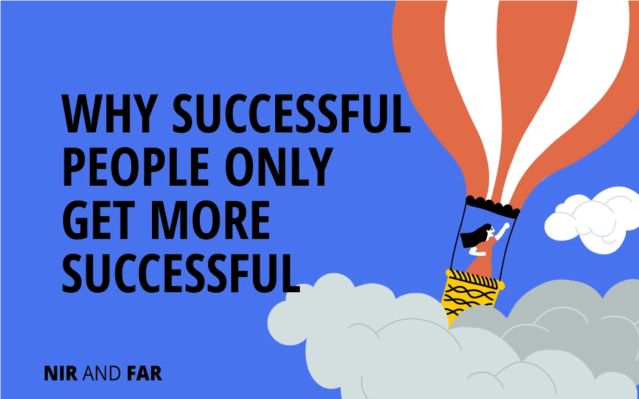Optimism
Why Successful People Keep Getting More Successful
Is there a reason everything some people touch turns to gold?
Posted June 25, 2024 Reviewed by Abigail Fagan
Key points
- Early success often creates momentum for future achievements.
- Self-belief and optimism drive continued success.
- Successful people leverage growing networks and their reputation.

Do you know those people who just seem to get more and more successful? It’s as if each success gives them momentum to achieve even more.
Bridgit Mendler is a former Disney child star turned singer, lawyer, and entrepreneur. Amor Towles was a very successful investment banker for two decades and then became a very successful author. Toni Morrison, Stephen King, and Haruki Murakami have published and sold not just one but many different books to millions of people worldwide.
Well, there may be a secret to their success, and no, it’s not just the obvious money, privilege, and social class (although those certainly count for something). It’s not even their natural talent.
Why is it that everything these people touch turns to gold?
Expectations
In 2014, researchers who wanted to test the veracity of the adage “Success breeds success” created website-based real-world social settings and randomly bestowed “successes” — ranging from funding to awards, product endorsements, and even “signatures of support” on social or political campaigns — on study participants.
In all scenarios, receiving a modest reward early on “triggered a self-propelling cascade of success” for those participants. (Yet receiving large rewards early on did not proportionally increase later success.) Because these rewards were distributed randomly, not based on merit, the study concluded that a person who sees such early success might later achieve more than someone who is similarly qualified or talented but didn’t receive early success.
The study author reasoned that the unmerited early success people receive “produces arbitrary inequality by raising their future success expectations vis-a-vis equally talented non-recipients.”
Self-Belief
A more recent study of the same subject took a different approach, enlisting equally abled players to compete in a best-of-three contest experiment. The results reveal that players who won the first round did indeed see better performance later. But winning alone was not the cause. Only when winning increased players’ confidence did it give them momentum toward success. “The effect of winning seems driven by an information revelation effect, whereby players update their beliefs about their relative strength after experiencing an initial success,” the researchers wrote. “Even with an initially even playing field, subjective self-confidence can play a critical role in future performance and, therefore, contribute to putting identical people on different paths in terms of long-term success.”
Status
From these studies, we understand that self-belief and expectations spur success. But that’s not all. As a person’s success builds, so does their network and reputation, which easily opens more doors to success.
There’s a term for this: the Matthew effect. Coined by sociologist Robert K. Merton in 1968, the Matthew effect posits that the work of high-status people receives greater recognition than work of equal quality by lesser-known people. At least two studies testing the Matthew effect determined it’s a real phenomenon, at least in the science community.
In the 2014 study, researchers compared the citation rates of papers before and after the scientists who’d written them won a prestigious science title. Then, they compared those citation rates to a control group of papers published by scientists who hadn’t earned the title. Results found a 12 percent bump in citations of papers after the scientists were recognized, leading experts to conclude that the Matthew effect plays a major role in scientists’ careers.
Also validating the Matthew effect is a 2018 study that tracked the career trajectories of winning and losing applicants to a Dutch grant program. The program used a points system to score applications and awarded funding to scientists whose applications met or exceeded a certain number of points. The study examined applicants just above and below the threshold, as their work quality would be similar, and found that over the next eight years, winners secured more than twice as much funding as nonwinners. That was just the beginning of the benefits that winners saw.
The study author offered two explanations for how the Matthew effect operates: Winning funding gives scientists accolades that increase their likelihood of winning more awards, funding, and jobs. Second, and critically, winners continue to seek grant money while discouraged nonwinners give up.
Optimism
Failure is practically a prerequisite for success, as any successful person will tell you. Steve Jobs — who was ousted from Apple before rejoining it when his next company, NeXT Computers, was acquired by Apple — is a well-worn example.
So, failure is not what inhibits success. A person’s outlook after that failure does.
One 1990 positive psychology study of athletes showed that optimism can lead to success even in the short term. The study had college-level swimmers complete a questionnaire to determine whether they were optimists or pessimists. Then, the swimmers were told to swim their best race, and afterward, the researchers gave each athlete a swim time that was slower than their actual time. After a few hours’ rest, the athletes swam again.
The study results showed that while the optimists swam 0.5 percent faster on average during the second round, the pessimists swam 1.6 percent slower. The author concluded that optimists saw failure as an opportunity to do better, while pessimists were simply discouraged.
These studies argue that expectations, optimism, and positive beliefs drive success. Successful people aren’t necessarily smarter and more talented than less successful people.
So, while you might not currently be as successful as Amor Towles, Bridgit Mendler, or whichever uber-successful person makes you green with envy, you can adopt and leverage their successful mindset for yourself.
Pursue Success Like a Successful Person
Anyone with the right outlook can find the momentum of success. Here’s how you build it for yourself.
1. Grow Your Self-Belief
Throughout our lives, we have experiences that lead us to label ourselves in specific ways; then, we tend to stick with those labels and their accompanying behaviors. Yet expectations form our reality, so we should take care not to label ourselves in ways that limit us.
The first step to building new beliefs is to challenge your old ones: Identify and challenge the limiting beliefs that undermine your confidence and expectations of success. Replace these beliefs with more realistic perspectives. Reflect on and celebrate your strengths, talents, and past successes. Remind yourself of your capabilities and resilience in overcoming challenges.
To shake up your self-beliefs and tap into your potential, push yourself outside your comfort zone. Take a risk or try something new, and you might learn something about yourself or conquer a fear. Plenty of successful entrepreneurs practice facing their fears, including Tim Ferriss, who quit a corporate job and wrote a book called The 4-Hour Workweek that was rejected by 26 publishers before it sold and became a global hit. Just the simple act of trying increases your chances of success.
2. Practice Optimism
Once you have a new view of your self-beliefs, practice positive self-talk to enforce them and improve your self-confidence. Pay attention to your internal dialogue and replace negative thoughts with affirmations.
3. Expect Success
To boost your expectations for success, use positive reinforcement. My advice to people who want to build a new routine or habit is to start with a minimum enjoyable action — a task or activity that’s so easy, it’s laughable — and track it. If you want to write a book, for example, tell yourself you’ll write one sentence daily.
Over time, the tracker allows you to visualize how many times you have done that task. If you skip a few times — which is inevitable! — don’t berate yourself. Use the opportunity to practice optimism and positive self-talk. You might have backslid a little, but the tracker shows you were capable of sticking to your routine. You can do it again.
Remember, success isn’t just about striking gold; it’s about building unwavering self-belief, expectations for success, and optimism that prevent you from accepting failure.
A version of this post also appears on NirAndFar.com.




